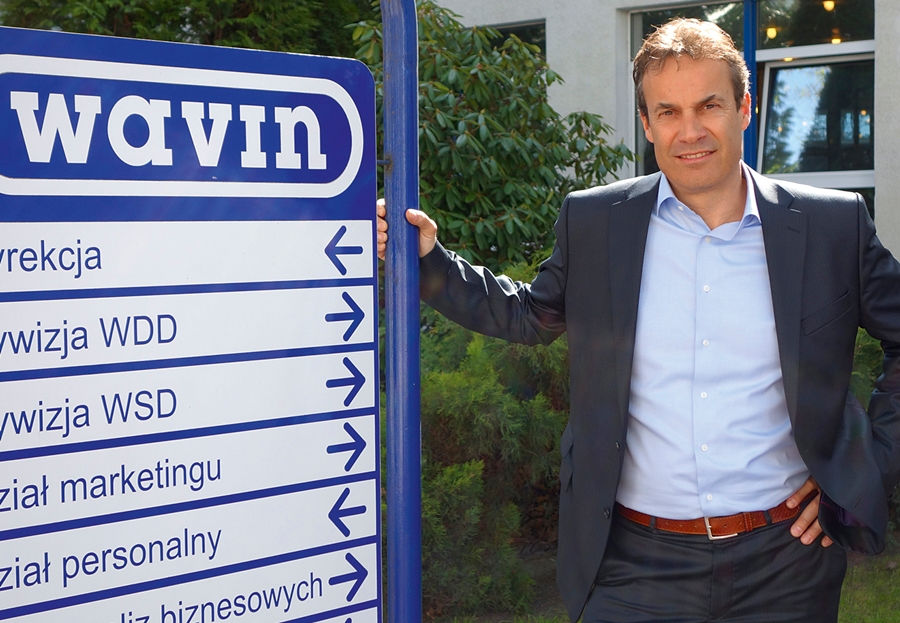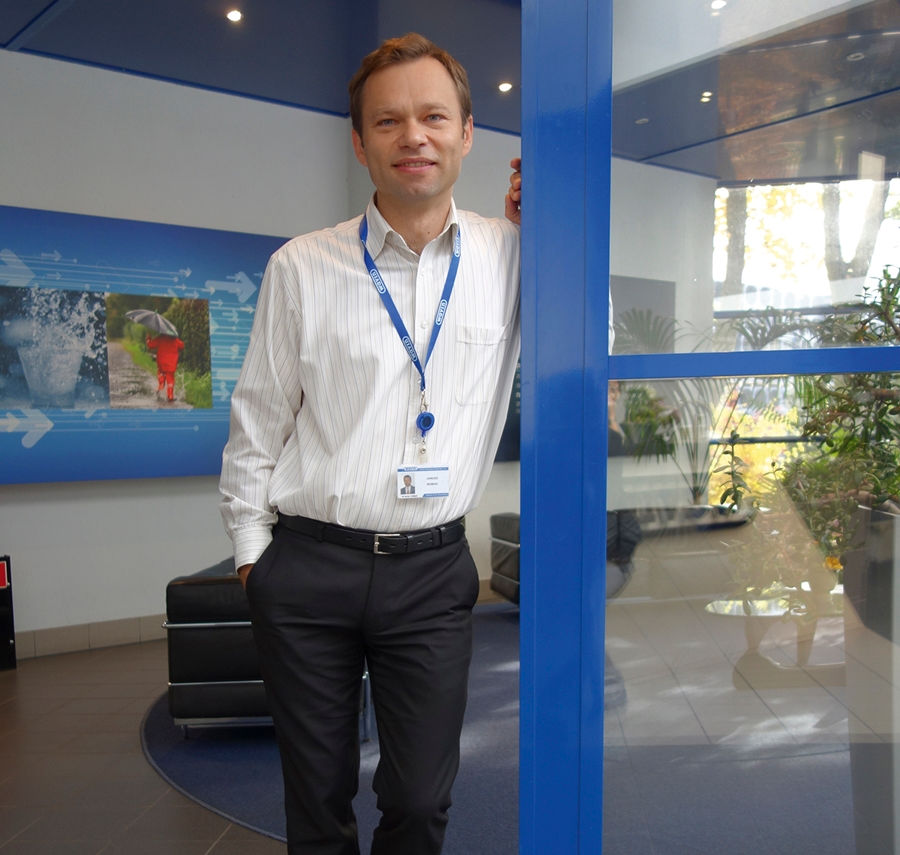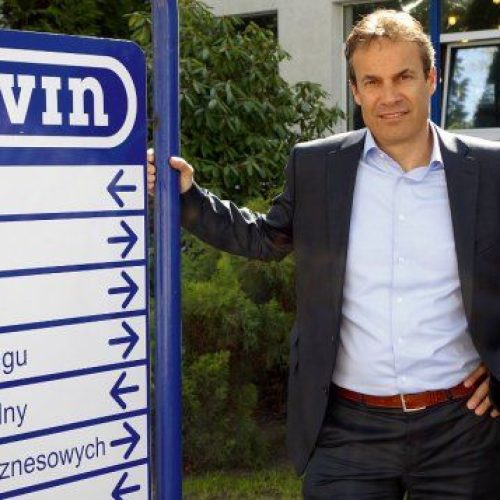At what stage is the program of rollouts at Wavin?
Immediately after completion of the project in Poland, the work in the Czech Republic and Slovakia commenced. The work in the Hungarian company as well as in the Scandinavian countries (Denmark, Norway, Sweden) is also underway. The last wave of rollouts will incorporate: Ireland, Finland and the Baltics (Latvia, Lithuania and Estonia). Other companies have already been covered by the corporate SAP.
We have a very tight schedule, but so far, we have been sticking to the plan. Anyway – from project to project the efficiency of work increases. The “golden rule" that we have adopted is to carefully analyze the experience of the completed rollout, draw conclusions and improve our methodology. In this way, we do not have to reinvent the wheel each time.
What other rules do you follow in the program of rollouts?
First of all – in such a complex program that is critical to the operation of our company, there is no room for improvisation. That’s why we have developed our own methodology based on best practices for IT project management, which has been refined from project to project – as already mentioned.
The precise definition of the roles and responsibilities of participants and making sure that it is clear to them from the first day of work – is another rule of ours.
We attach great importance to the competence of persons involved in the projects and their availability. The SAP rollout is a huge additional burden especially for business people. We need to make sure that they understand from the very beginning the importance of the project and the expectations attached to them.
Master data – their good preparation for the system in the local divisions, the amount and organization of work, the distribution of tasks and responsibilities – are often an underestimated element of projects. We do not make this mistake.
And finally, communication within the project. Experience teaches that the lack of the structure and form of information transmission determined in advance can result in unnecessary loss of time and misunderstanding. Regardless of whether we use a dedicated tool for the exchange of information or communicate via e-mail – we need to make sure that information on the status of work reaches the interested people and them alone, at the right time.
What are your goals as the Wavin Connect-IT Project Manager?
The company’s Board has obliged me to deliver an SAP solution that will standardize business processes in a single IT solution coherent for the whole Wavin group. This means that each of the local companies should reorganize its activities and change processes in such a way so as to match the SAP template developed for us to the greatest possible extent. The reorganization involves the utmost unification of the IT environment, or if possible – the replacement of third-party applications with SAP solutions.
Deviations from the corporate SAP template are accepted only if they result directly from local legal requirements or if a local solution can affect the improvement of the template. In such cases, we incorporate it throughout the organization.
An example here is batch management on raw materials and components in order to improve tracability of our product.
Isn’t such an approach – “0 gap” – contested in local companies?
My task and the task of the boards of companies in individual countries is to make users aware of the objectives of the project and the expected benefits. That’s why we devote so much time in the projects to sessions showing the impact of an integrated system on business, both in the local and global perspective. To inform, train, conduct workshops as much as possible – in my opinion, it is the best way to dispel users’ doubts. In the end, SAP is the global standard of ERP solutions, and striving to maintain the highest possible consistency of the template in the company has a business justification. I’m omitting here – of course the most important – aspect of business effectiveness. From my perspective, as the person responsible for IT, such a restrictive adherence to the template is necessary to run the program of rollouts smoothly while keeping a tight rein on costs of this undertaking. And in the future – this will enable the central management of SAP development and maintenance of a central helpdesk for users in the whole group.
How is the Wavin IT team organized?
As far as SAP is concerned – our forces in the headquarters in Zwolle were divided into two teams: an implementation team that I have the pleasure to manage, and a service team that supports SAP users and carries out small development work in our headquarters in Zwolle.
We have a strong implementation team with broad competencies and extensive experience. We do most of the work and manage the rollouts.
Currently we have 3 roll-out teams working at the same time on 3 different projects. The teams consist of consultants from Wavin, as well as central and local external parties. In total the number of project members is around 40 people, There knowledge is spread over all areas of the SAP system. Most of the people have experience in multiple SAP roll-outs for Wavin.
Next to the project teams we also make use of our fixed based people in Zwolle also covering all Sap functional areas as well as the more general areas like BI, Basis, Authorisations, release management etc.

Wilbert Bax, SAP Program Manager in Wavin
From my perspective, as the person responsible for IT, such a restrictive adherence to the template is necessary to run the program of rollouts smoothly while keeping a tight rein on costs of this undertaking
Despite that, however, Wavin uses the services of third parties in subsequent rollouts.
Yes, the use of external competencies is convenient and cost effective for us. Firstly, we do not have to excessively expand our team. Engaging an experienced SAP consultant is not easy at all for us, and financial expectations – high. Secondly, we turn to external competencies in such a field and to such an extent as is the most beneficial for us at a specific time. This allows us to maintain a fast pace in further projects.
Do you use the support of local companies in each country?
Not really. For example, BCC (now All for One Poland), which we engaged for the rollout to the Polish company, currently supports us in projects in Wavin Ekoplastik in the Czech Republic and Slovakia. We evaluated BCC consultants’ competencies in the Polish project very highly. They got to know our business and the system template very well, so we thought their experience was worth using in another country. In some areas of the rollout in the Czech Republic, BCC employees are now leading consultants. This reduces the workload of our team, which can conduct projects in Scandinavia at the same time.
Such nearshoring of IT/SAP services is a strategy that works well with us. The knowledge of a foreign language is not a problem today. And the geographical and cultural proximity as well as the high competencies of consultants – are very important advantages. If BCC can relieve our specialists by doing the work at the level expected by us, as well as offering favorable pricing terms, why not?
The program of rollouts ends in a year. What next?
Definitely, the Wavin Connect-IT program is the biggest IT undertaking in our history. But the dynamically developing company practically always requires new IT solutions.
Already now we are starting a template uplift program (to improve the template where possible) which enables us to gain more benefits from the common platform we are all working. Also we will implement missing functionalities which are currently not covered in the template yet (eg. Plant maintenance and Quality mgt). And last but not least we are moving towards the latest technical capabilities of SAP to improve the user experience. An example here is upgrading our Business Intelligence platform to the latest new standard, which is expected to improve the speed and user-friendlyness of our reporting tools. (For this part we again work together with BCC to speed up the execution) Also a lot of new initiatives are underway in the area of E-business.
As you can as the SAP roll-outs might be finished soon there are of lot of challenging opportunities for us ahead.
Interviewed by Mirosława Huk, All for One Poland
SAP rollouts in Wavin Poland and Czech Republic
The program of SAP rollouts has been underway in Wavin since 2006. In early 2014, a project of rolling the system out from the Dutch headquarters in Zwolle to Wavin Poland and Arot Poland based in Buk near Poznań came to an end. It was another milestone in the program of rollouts covering all Wavin companies in Europe. Currently, work is underway in the Czech and Slovak companies. A partner in both of these projects is BCC (now All for One Poland).
Wavin operates in 24 countries across Europe, maintaining a leadership position in the industry of plastic piping systems in each of them. This is the company’s strategy – operating on such markets on which it may be the best and the biggest in its field. This in turn requires the continuous optimization of business: introducing new products and modernizing the range of products, improving the quality of customer service and optimizing business processes at every stage.
SAP in the whole group
One of the management tools aimed at gaining and consolidating leadership is a central management system – SAP ERP. Currently in Wavin, a program called Wavin Connect-IT is underway. Its purpose is to cover all European local companies with this integrated system.
The implementation of the program is the responsibility of an internal SAP Wavin competence team, which has extensive experience gained during previous rollouts in other companies of the group. Should the need arise – in various countries the company is supported by third party companies. The strategy of rollouts and maintenance of the SAP corporate template in Wavin is conducive to the fast pace of work. The Wavin management adopted the approach of the closest possible adherence to the solution prepared in the headquarters, and allowing for deviations in local companies only in exceptional situations and, of course, where a different method of the process execution is determined by the law in force in individual countries.
What’s interesting – and rare – the unification of the SAP solution includes also the use of the language version of the system. In principle, Wavin does not run it in local versions (which allow operation in a national language). All users – both in Poland, the Netherlands and in the other countries – use the SAP version in English. On the one hand, it is problematic because it requires from users at least a basic knowledge of English; on the other hand, however, it enables a centralized support for all users throughout Europe, which is provided by the service team in Zwolle. Of course, templates of printouts of invoices, orders and other documents required in dealings with the authorities or contractors are available in Polish.
As a side note, it is worth mentioning that English was also the project language – due to the leading role of the implementation consultants from the company’s IT team.
After launching the system in nine companies (including the Dutch headquarters, as well as in Italy, Romania, France, the UK and Turkey), in mid-April 2013, another project was initiated as part of the program of SAP ERP rollouts – to Polish companies Wavin and Arot, based in Buk near Poznań. Shortly after the completion of this project, in early 2014 another rollout began – this time directed to Wavin Ekoplastik in the Czech Republic and Wavin Slovakia.
Although Wavin has its own strong IT/SAP competence center, the company decided to involve in the rollout in Poland and the Czech Republic – alongside the consultants from the Wavin group’s headquarters in the Netherlands and employees of Wavin Metalplast in Buk – an external partner – BCC. Our support covers the entire functional scope of SAP ERP: financials and fixed assets, materials and warehouse management, production planning, sales and distribution, as well as SAP APO (Advanced Planning & Optimization) solutions.
A change of the system, a change of the business
In the Polish company Wavin, the corporate SAP system replaced several solutions used previously, including Axapta and Quguar (for warehouse management). As part of the project, a new ECM solution (currently Rockawork) used in the whole group was also implemented. It replaced a smaller, locally used application for document management.
The Polish company occupies an important place in the Wavin group, which translates into a very large number of processes carried out in all fields of business. The adopted assumption – to introduce changes in the business processes of the division rather than in the system configuration – entailed a large reorganization of the current way of operation. Over 90% of the processes that make up the SAP Wavin model are applicable in Poland and the vast majority of them were carried out differently in previous applications.
At the first meeting of the project teams, it was strongly emphasized that the new system would provide at least the same functionalities as the previous ones, but that it did not mean that the same process solutions would be used. This was a clear message to the users that the project would bring about not only changes of the tool, but mainly changes in the organization of work.
Despite the assumption to stick to the template as much as possible, it was decided to make some changes to the Polish solution. Most of them were forced by the necessity to adapt to legal requirements, whereas a part of them had a business justification. The latter were associated, among others, with the interface to the Webshop and EDI platform, the product configurator, as well as with planning of inventory levels at customer consignment warehouses and other WM processes, especially those supported by radio terminals.
Being aware of the large scale of these changes and experiences from previous rollouts, the position of a Change Manager was established for the duration of the project in Wavin Poland. Mr Janusz Nowak, who together with Wilbert Bax, the Rollout Project Manager at Wavin, managed the project in the Polish company, was appointed to this position. (after July 2013 the project management of IT was taken over by Hans Ebben, to enable Wilbert Bax to focus more on the overall roll-out program).
Janusz Nowak speaks on the role of the Change Manager: “The project was managed by two people: the IT Project Manager and the Business Project Manager. While fulfilling the latter role, I also took over the Change Manager function, and thus the responsibility for the identification and introduction of organizational changes. This is a typical time-constrained project role, which began after the completion of the analysis phase and approval of the list of system and organizational changes. My tasks included the establishment of a project communication plan and the analysis of stakeholder expectations.”

Janusz Nowak, Financial Manager of Small Companies of the Central and Eastern Europe Region, Wavin
We are all aware that the speed of information processing, its consistency, and the capabilities to report and analyze the data that we have gained, translate not only into our operational efficiency, but also to the company’s financial results
During the project, the company also underwent other major organizational changes, which were a big challenge for the SAP teams. These included the transfer of the production of Arot from Leszno to Buk and the establishment of the financial and accounting Shared Services Center for Wavin in Poznań. Firstly, they involved key users – leaders of project teams, and secondly, they required additional changes in the system.
Training, that is to tame the unknown
For Wavin employees, SAP users, it was a very busy time – many of them participated in the activities of the working teams, developing the solution concept and adapting existing business processes to the requirements of the corporation. They also participated in other projects ongoing in parallel, and of course they all had to learn a new way of work, in a new tool, within a short time.
The related project risk was minimized through education. As pointed out by Janusz Nowak: “People are mostly afraid of the unknown. Therefore, we put a great emphasis on training of future users. In the initial phase of the project, we made them familiar with the system by carrying out an intensive program of training courses and workshops on “live" SAP. By getting to know the logic of the system, the users could better understand the necessary changes that occurred in the everyday activities they performed. We wanted to make sure that employees understood the position and role of “their" processes in the company and their impact on other areas”.
The aim of this project – as a part of a large program of SAP rollouts in the company – was bringing the Polish company closer to other divisions of Wavin, already operating on SAP. The standardization and simplification of processes in a consistent IT environment are particularly important given the growing role of the Polish company. The increasing volume of production or centralization of financial and accounting processes in SSC are challenges that require bigger organizational efficiency and tight integration of processes and IT tools in use. In particular, Wavin Poland carries out many business transactions with other companies in the group. Therefore – from a financial perspective – the automatic generation and distribution of invoices significantly accelerate this process and do not require manual intervention.
In the warehouse – SAP and scanners
Another area undergoing significant changes is warehouse management. The implementation of SAP WM helped standardize processes in all warehouses in Poland (Buk, Sochaczew, Katowice) and other countries. The standardization of information about a logistic unit (a pallet number, a material number, a number of a specific product batch) and integration of the flow of this data in a single system brings such benefits as fast identification of a given material pallet in the system and performance of other warehouse operations, elimination of the need to duplicate data in two systems, which often led to errors, reduction of the workload required to control quantitative discrepancies of specific goods in different systems. Currently, there is no need to re-print a logistic label when goods are received from a different company of the group, and a report on materials tracking throughout the supply chain is available from a single system.
SAP and the introduction of terminal operations (barcode readers) brought more order and tightened inventory control in the warehouse. Currently, virtually all warehouse operations are performed using scanners, which eliminated a large number of mistakes, for example in the process of picking materials for shipment (previously, a warehouse operative noted down the number of a picked pallet manually and passed on the notes to the shipment management office where they were entered into Quguar). In SAP WM, all shipments to the customer are prepared using scanners that operate online, and it is not possible to scan and issue a different pallet to the customer or to a different warehouse. This is controlled by validation mechanisms, which in the case of inconsistencies immediately send an error message.
SAP WM enables efficient warehouse management through greater control over the data, their verification and restriction of possible user changes that in the long run can affect the complex warehouse structures. Putting the warehouse structure and storage bins in order during the project was one of the activities which helped significantly shorten the time of receipt and issue of deliveries (it is worth remembering that the warehouse in Buk has an area of 20 ha).
WM is also tightly integrated with the other logistics modules, including SD. This means that the movement of goods initiated from any logistics module from or to a storage location incorporated into the warehouse management is continued in the WM module, without having to use any interfaces between ERP and WM. The elimination of a large number of interfaces (that previously connected various systems) helped significantly to improve performance and lift restrictions for a growing number of business operations.
Ready, steady, go!
Close cooperation of all parties involved in the project (IT consultants from the Dutch headquarters, employees of Wavin Poland and specialists from BCC) and their extensive experience as well as high motivation significantly contributed to the success of the project. The system went live on schedule. On January 7, the first transports handled in SAP WM using terminal transactions were sent to customers, invoices were generated, production orders were received and confirmed, and the SAP APO solution for production planning was launched.
In the first weeks after the go live, the Polish users were still supported by consultants from the headquarters and key users from other companies of the group. After this period, the system was handed over to the Wavin IT service team at the Dutch headquarters for standard operation.
When analyzing the benefits derived from the project of the SAP rollout to Wavin Poland, it is hard not to judge them through the prism of the Wavin Group as a whole. Janusz Nowak, who outside the SAP project is a Financial Manager of Small Companies of the Central and Eastern Europe Region, sums up:
“Changing the system in our case was to a large extent a business project. The necessary reorganization of processes for many users was much more challenging than learning how to use the new tool. At the same time, we are all aware that the speed of information processing, its consistency, and the capabilities to report and analyze the data that we have gained, translate not only into our operational efficiency, but also to the company’s financial results. Wavin Poland is also a part of a larger whole, and the consistency of both the processes and IT tools can establish our competitive advantage in the global market.”
Now, the Czech Republic and Slovakia
Since February 2014, a similar project has been underway in the Wavin Ekoplastik plant, located in Kostelec nad Labem and in Wavin Slovakia in Bánovce nad Bebravou. As was the case in Poland and other countries, the approach of the closest possible adherence to the corporate template was applied. Also in this rollout, Wavin is to a large extent supported by BCC (now All for One Poland). The go live is scheduled for early 2015.
Cooperation: Mariusz Stawski, Marcin Fornalczyk
The group comprises the companies Wavin Poland and Arot Poland, a leader in the production of housing pipes for cables. Both companies are located in Buk near Poznań.
Wavin Ekoplastik s.r.o. from Kostelec nad Labem in the Czech Republic and Wavin Slovakia s.r.o. based in Bánovce over Bebravou (Slovakia) are the largest manufacturers of plastic pipes for water and heating in their countries.


